|
|
|
Sort Order |
|
|
|
Items / Page
|
|
|
|
|
|
|
| Srl | Item |
| 1 |
ID:
162545
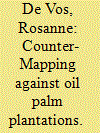

|
|
|
|
|
| Summary/Abstract |
This paper explores how villagers in Sambas District of West Kalimantan, Indonesia, attempt to protect their land rights against oil palm companies by engaging in mapping and spatial planning, in the context of the implementation of Indonesia's 2014 Village Law. Drawing on theoretical debates about counter-territorialization and counter-mapping, this paper considers how villagers use the Village Law to legitimate control over their territory. Although village-level spatial planning and mapping initiatives do not guarantee that land rights will be protected in the long term, spatial plans and maps can serve as leverage in negotiations with oil palm companies and government officials. Moreover, mapping and spatial planning help to organize people and boost discussions about land rights and different aspirations for land use. Proactive village-level spatial planning is necessary to find ways to maintain pre-existing ways of using land, and to counter notions of empty land, available for companies to claim.
|
|
|
|
|
|
|
|
|
|
|
|
|
|
|
|
| 2 |
ID:
088013
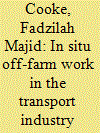

|
|
|
|
|
| Publication |
2009.
|
| Summary/Abstract |
This paper examines the informal transport sector within the smallholder oil palm economies of Kinabatangan and Lahad Datu areas of eastern Sabah by looking at the metaphoric border that is constructed between licit and illegal activities that take place on roads. It describes the work of two groups of drivers, namely, those who are themselves smallholders who provide a crucial service to the community in getting their fresh fruit bunches to mills on time; and the piret (pirate) taxis who transport passengers including foreign nationals, some of whom are illegal workers. Many have been driving for some time, thereby challenging the notion about off-farm work as providing a temporary safety net to smallholders. Drivers whose permits may be current may have used illegal means (such as meminggir - logging without licence), to accumulate the initial funds for acquiring their vehicles and necessary permits. Moreover, their clients are unconcerned about their 'illegal' status. Consequently, this paper maintains that there is no agreed-upon norms about legality/illegality, and law enforcement being uneven, the zone in which drivers operate is a fluid one.
|
|
|
|
|
|
|
|
|
|
|
|
|
|
|
|
| 3 |
ID:
117138
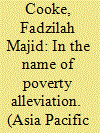

|
|
|
|
|
| Publication |
2012.
|
| Summary/Abstract |
Oil palm in Sabah is grown in large plantations or smallholdings, the latter mostly managed by indigenous peoples on untitled customary land. Government development agencies have long focussed on improving the productivity of smallholders for poverty alleviation. For most smallholders, the main issue is tenure insecurity: as long as lands remain untitled they are subject to changes in land allocation and land use at the discretion of the State Government. Indigenous claimants seek recognition of the right to use and occupy ancestral lands via individual Native Titles (NT), as provided for in the Sabah Land Ordinance (SLO). Recent official push for converting such 'idle' customary lands by promoting large scale joint ventures between customary landowners and oil palm companies is creating anxiety among many indigenous groups. The joint-venture approach has been enabled through a crucial amendment to the SLO that promotes the granting of communal titles (CT) with conditions attached. This tenure instrument empowers state-appointed trustees to make key decisions concerning land use where commercial crops (especially oil palm) are favoured and on the eligibility of descendants (pewaris) to participate in the joint venture or not. The complexity of local concerns and official responses is captured via a case study at Lalampas in the Tongod District of Sabah.
|
|
|
|
|
|
|
|
|
|
|
|
|
|
|
|
| 4 |
ID:
117142
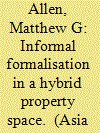

|
|
|
|
|
| Publication |
2012.
|
| Summary/Abstract |
Across post-colonial Melanesia, the benefits and costs of 'mobilisation' of customary land for economic development remain much debated among scholars, activists, policy-makers and the donor community. This paper presents a case study from Solomon Islands of a hybrid property space in which smallholder oil palm blocks are being established on customary land through an informal 'smallholder land use approval' system. This system provides salutary evidence of how customary land can be engaged for commercial agricultural activity without recourse to formalisation. It also potentially provides a more equitable pathway for landowners, especially women and young men, to engage in the oil palm sector, with the only current alternative being the registration and leasing of land directly to the oil palm company. However, enthusiasm for the scheme must be tempered by an explicit awareness of the relationships between land, development and conflict on the island Guadalcanal where the oil palm operation is located. The nascent 'informal formalisation' and commercialisation of customary land that is taking place on Guadalcanal is subjected to a conflict analysis informed by both the recent history of violent conflict in the area and comparative experience from the village oil palm sector in neighbouring Papua New Guinea. A number of potential conflict stresses are identified and recommendations made to mitigate them.
|
|
|
|
|
|
|
|
|
|
|
|
|
|
|
|
| 5 |
ID:
152524


|
|
|
|
|
| Summary/Abstract |
This paper examines intra-household and socio-cultural factors leading to differential outcomes in educational attainment by gender and birth order amongst smallholder oil palm households in Papua New Guinea. Not all children share equitably in the household resources allocated to education: females have lower average education levels than males, and high birth order children have higher education attainment than lower birth order siblings, indicating preferential parental investment in sons and early born children. The findings demonstrate that despite households having regular access to relatively high incomes from oil palm and residing in close proximity to schools, primary school net enrolment rates remain significantly lower than those for East Asia and the Pacific region, and the millennium development goal of universal primary education has not been met. This finding is likely to be the result of a combination of intra-household factors including gender power imbalances, low parental education levels, the agency of youth in educational decision-making and the weakening attraction of education as a means of improving income-earning potential.
|
|
|
|
|
|
|
|
|
|
|
|
|
|
|
|
| 6 |
ID:
144846
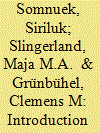

|
|
|
|
|
| Summary/Abstract |
As part of the Thai Government's objective to increase energy security through biodiesel, oil palm was introduced to Northeast Thailand in 2005. Nong Khai Province was selected as a pilot project because of its suitable environmental conditions. This study assesses the acceptance of policy interventions and socio-economic conditions by adopters and non-adopters. We found that total farmland size was significantly higher among oil palm producers than among non-producers. Nevertheless, the area under oil palm cultivation did not increase in accordance with land size in the way rubber did. Oil palm and non-oil palm farmers had almost equal amounts of rice area thereby providing household food security. Oil palm did not replace food crops. Farmers investing in oil palm tend to base their livelihood around on-farm production, whereas non-adopters tend to diversify with off-farm income sources. Oil palm was found to be one component of a diversified farming system and an additional income source, albeit not the primary one. In conclusion, oil palm was a crop that had been tried by (wealthier) farmers with sufficient capital, and an aim to further diversify on-farm household income. Oil palm is certainly not (yet) contributing substantially to household income in Thailand's Northeast.
|
|
|
|
|
|
|
|
|
|
|
|
|
|
|
|
| 7 |
ID:
120233
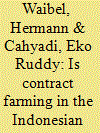

|
|
|
|
|
| Publication |
2013.
|
| Summary/Abstract |
This paper assesses the impact of contract farming in the oil palm industry in Indonesia on smallholders' well-being and investigates its implication for poverty reduction. Data were collected using random sampling from 245 smallholders in the province of Jambi, Sumatra. A treatment effects model was applied in order to capture endogeneity and selection bias. Results show that participation in contract farming is significantly associated with type of household, age of household head, size of oil palm plot, and the time of plantation establishment. While contract farming has a significant positive effect on smallholder income overall, it discriminates against poorer smallholders. It is recommended that the agro industry and government review contractual arrangements in order to increase the chances of the poor benefiting from oil palm expansion in Indonesia.
|
|
|
|
|
|
|
|
|
|
|
|
|
|
|
|
| 8 |
ID:
191861
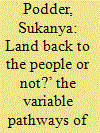

|
|
|
|
|
| Summary/Abstract |
Drawing on empirical research from Pujehun and Port Loko districts in Sierra Leone, this article explains the variable pathways of civic activism mobilised by environmental advocacy, and legal empowerment organisations, in response to two prominent land grabs. By grounding the analysis within the ontology of place, this study examines the dynamic interplay between national politics, global corporate interests, transnational advocacy, and civic agency in each place. The article finds that although the balance of power between these actors matters, the nature of corporate interests involved can be significant in determining the exact trajectory of civic mobilisation, and ultimately its success.
|
|
|
|
|
|
|
|
|
|
|
|
|
|
|
|
| 9 |
ID:
171401


|
|
|
|
|
| Summary/Abstract |
Several countries across sub-Saharan Africa have promoted industrial crops to boost rural development, including rural energy poverty alleviation. However, little evidence exists about the intersection of rural development and energy poverty in industrial crop settings. We undertake a household survey to explore multidimensional energy poverty patterns around three operational industrial crop projects in Ghana (oil palm, jatropha, sugarcane). We conduct 850 surveys with households with different involvement in these projects (e.g. plantation workers, smallholders), as well as household not involved (i.e. control groups). Overall, distinct patterns emerge between sites and groups, reflecting the different area, project and household characteristics. Jatropha and oil palm plantation workers register lower energy poverty levels than their respective control groups, while oil palm and sugarcane smallholders register either the same (or higher) energy poverty. This is largely because income from engagement in industrial crop activities can reduce energy poverty for some groups, but only where modern energy options are readily available. In reality, other factors can be equally important, including other livelihood activities (e.g. sugarcane/palm oil processing) and the gender of household head. Such distinct patterns and local dynamics must be understood when aiming to achieve positive energy poverty alleviation outcomes through industrial crop expansion.
|
|
|
|
|
|
|
|
|
|
|
|
|
|
|
|
| 10 |
ID:
117140
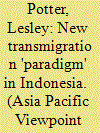

|
|
|
|
|
| Publication |
2012.
|
| Summary/Abstract |
Transmigration from Java to rural areas of the 'outer islands' appeared finished in Indonesia after the fall of the Suharto regime in 1998 and decentralisation in 2001. However, the rapid growth of oil palm plantations in the past decade has led to a renewed call for transmigrants by district heads seeking an expanded labour force. A new system has evolved on a district-to-district basis with applicants in 'sending districts' (in Java, Bali and the poorer provinces of East and West Nusa Tenggara) being matched to requests from 'receiving districts' (in Sumatra, Kalimantan, Sulawesi and Papua), which largely depend on levels of plantation investment near proposed new transmigration sites. Coordination is in the hands of a rebranded central Ministry of Manpower and Transmigration. Integral to the 'spatial' organisation of the new transmigration will be the creation of towns or cities, known as KotaTerpadu Mandiri ('Integrated self-sufficient city'). A new transmigration region (with its oil palm plantations) will form the 'embryo' for the city's growth. Although these arrangements will aim to reduce poverty, their social and environmental costs have not been evaluated. Examples of these new schemes in parts of Central Kalimantan are discussed, with brief comparisons of earlier transmigration projects.
|
|
|
|
|
|
|
|
|
|
|
|
|
|
|
|
| 11 |
ID:
117139
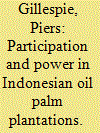

|
|
|
|
|
| Publication |
2012.
|
| Summary/Abstract |
Participation is commonly accepted to be a process that brings stakeholders together to define issues and create mutually beneficial outcomes. In the fields of development and natural resource management, participation is such a widely accepted part of policy that it is rare to find a project or programme that does not exhort the practice of participation and stakeholder engagement. However, despite the considerable weight of orthodoxy advocating greater participation and stakeholder engagement in development, the participative processes and power relations underpinning such engagement are rarely analysed in careful detail. This is particularly the case with oil palm plantations in frontier Indonesia and the interactions between the principal stakeholders at the plantation-community level. There has been minimal analysis to date appraising how such stakeholders interact in relation to a plantation, and there is limited description outlining the divergent viewpoints from such stakeholders. The paper argues that one local stakeholder group, oil palm smallholders, usually possess some agency in their decision-making and interactions with a plantation organisation but that existing structural and informal modes of interaction often limit the transformative potential of participation for all stakeholders.
|
|
|
|
|
|
|
|
|
|
|
|
|
|
|
|
| 12 |
ID:
117143
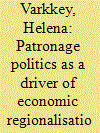

|
|
|
|
|
| Publication |
2012.
|
| Summary/Abstract |
Recent evidence has linked illegal peat and forest fires in Indonesia to commercial oil palm plantations. Fire is the most cost-efficient way to clear land for planting, but these fires release smoke causing transboundary haze pollution. The countries worst affected by the haze are neighbouring Malaysia and Singapore. Malaysian and Singaporean investors control more than two-thirds of the Indonesian oil palm plantation sector and they have been implicated in the fires alongside local plantations. Using information obtained from interviews with individuals linked to the sector, this paper aims to explain why these companies continue to burn despite the dire consequences of the haze. It identifies patronage politics as a common business culture in Southeast Asia, and argues that because these Malaysian and Singaporean investors are already familiar with patronage practices at home, they have easily inserted themselves into existing patronage networks in Indonesia. Hence, these companies enjoy the protection of their Indonesian patrons during their operations. Furthermore, in a business atmosphere defined by patronage politics, clients are largely motivated by material gain. This explains why Malaysian and Singaporean investors continue to clear land by fire in the interests of cost-efficiency, despite their home countries suffering the worst effects of haze.
|
|
|
|
|
|
|
|
|
|
|
|
|
|
|
|
| 13 |
ID:
117144
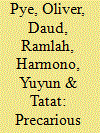

|
|
|
|
|
| Publication |
2012.
|
| Summary/Abstract |
Based on ongoing biographical research of Indonesian migrant workers in the oil palm plantations of Malaysia, this paper explores their different strategies of survival in a sector characterised by an ongoing precarity of livelihoods. The life stories of six workers from Sulawesi, Flores, Java and Sumatra are used to illustrate a tentative typology of migration experiences. As the workers set out from their own specific context of 'surplus population', they are confronted with a migration labour regime that is based on the social and political precarisation of the workers. However, in order to achieve their development aspirations, the workers find different ways of adapting to or circumventing the precarious labour regime. In particular, flight or absconding (lari) is used to change employers, to find better working conditions and to increase wages. Another key strategy is to increase the permanence of their stay, either by choosing illegality or by negotiating retrospective documentation. These strategies lead to the emergence of long-term transnational networks that change the social reality of the migration regime in the oil palm industry.
|
|
|
|
|
|
|
|
|
|
|
|
|
|
|
|
| 14 |
ID:
088017
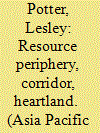

|
|
|
|
|
| Publication |
2009.
|
| Summary/Abstract |
The long borderland in Kalimantan between Indonesia and East Malaysia is partly mountainous and environmentally unique, its three national parks forming the core of a tri-nation 'Heart of Borneo' initiative proposed by environmental NGOs and ratified in 2006. More accessible lowlands in West Kalimantan and the north of East Kalimantan constitute a typical 'resource periphery' in which strategic considerations, persisting through the Suharto years, now intersect with a range of new political, economic and cultural demands. A perception by the central government of increasing lawlessness in the borderlands arose in the turbulent years following Suharto's fall, during 'reformasi' and the beginnings of decentralisation. In addition to smuggling and illegal logging, contests over land use erupted at various scales. Proposals to construct an oil palm corridor along the border, begun by the Megawati government and extended by some sectors of the Yudhoyono regime, were part of a quest for greater legibility and control on the part of the central authorities. The paper specifically examines the power struggles that arose over that project and its inevitable outcome, a central government back down. However, the current palm oil boom is bringing new corporate planting, which may eventually succeed in 'taming' the borderlands.
|
|
|
|
|
|
|
|
|
|
|
|
|
|
|
|
| 15 |
ID:
138257
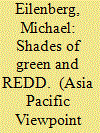

|
|
|
|
|
| Summary/Abstract |
In a time of increasing land enclosures sparked by large-scale environmental initiatives and agricultural expansion, this paper examines local and global contestations over the value of forest on an Indonesian forest frontier. Engaging with recent debates on carbon forestry, the paper problematises the emerging initiatives of ‘Reducing Emissions from Deforestation and Forest Degradation’ known as REDD+ in the province of West Kalimantan, Indonesia. The paper argues that the general rush to implement REDD+ without intimate knowledge of the political landscape of resource struggle is in danger of generating new enclosures of land that may be easily appropriated by local elites, thus excluding less fortunate sections of local society. The paper shows how divergent interpretations of REDD+ are triggering land disputes, and how powerful actors readily appropriate REDD+ discourses as a tool to support divergent claims of land ownership. Government and villagers, through overlapping and contradictory engagements, negotiate REDD+ initiatives with global environmental actors and private plantation companies. The paper highlights the implications of these local realities for the successes of REDD+. The Kalimantan case highlights some of the dilemmas of carbon mitigation initiatives experienced in frontier regions throughout Southeast Asia, places that have become prime battlefronts of large-scale climate change initiatives and agrarian expansion.
|
|
|
|
|
|
|
|
|
|
|
|
|
|
|
|
| 16 |
ID:
106698
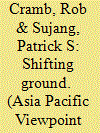

|
|
|
| 17 |
ID:
163240
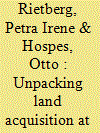

|
|
|
|
|
| Summary/Abstract |
Very few studies have captured the full complexity of land acquisition processes at the agricultural frontier. Specifically, the different stages in the land acquisition process and the changing responses of local communities to plantation development have not been adequately described and explained. Based on a detailed empirical case study of a land acquisition process in a village at the oil palm frontier in West Kalimantan, Indonesia, we address this knowledge gap. To comprehensively capture reactions ‘from below’ to large‐scale land acquisition, we use the interlinked concepts of access, property and authority. We show that the land acquisition process is basically a process of transforming and obscuring customary property rights and local authority. In our case, this process is characterised by an initial recognition of customary rights and local authority by the oil palm company. However, in the course of the process, these property rights and local authority are being transformed and eventually obscured. We call for a more interventionist state to prepare a less uneven playing field at the very beginning of land acquisition processes. This could slow down the nearly irrevocable obfuscation of customary rights and the erosion of local authority at the oil palm frontier.
|
|
|
|
|
|
|
|
|
|
|
|
|
|
|
|
|
|
|
|
|